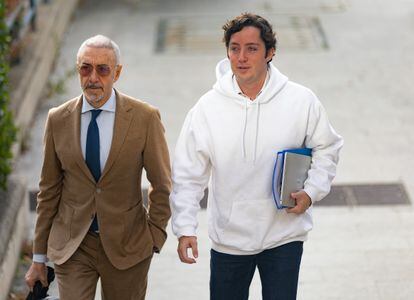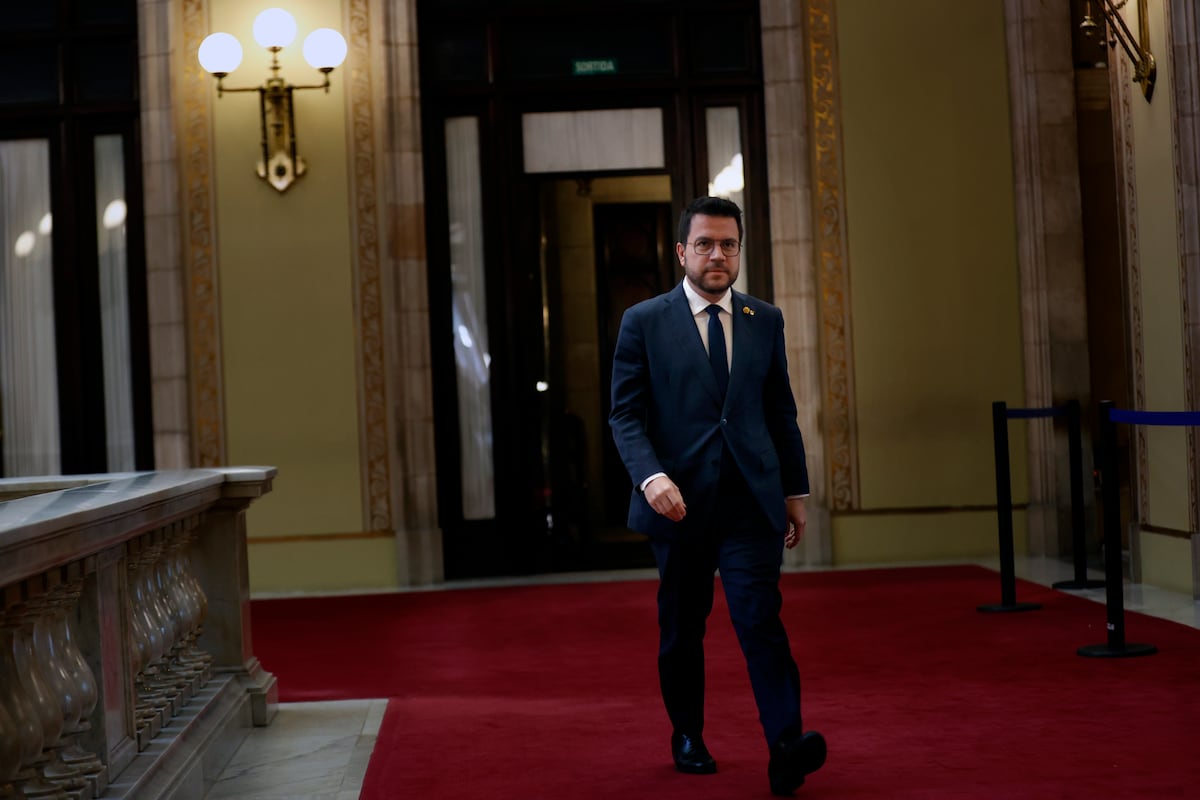The Provincial Court of Madrid has acquitted the retired commissioner José Manuel Villarejo;
his wife, Gemma Alcalá, and the journalist Carlos Mier for the crimes of discovery and disclosure of secrets of which they were accused for allegedly recording and participating in the broadcasting of the audio of a meeting held by agents on October 20, 2014 of the National Police and the National Intelligence Center (CNI) to deal with different aspects of the arrest, shortly before, of Francisco Nicolás Gómez Iglesias,
El Pequeño Nicolás
, for posing as an envoy of the Government and the Royal Household.
In the ruling, the court concludes that during the trial, held between November and December, it has not been proven that Villarejo or someone on his order manipulated the telephone terminal of one of the participants in that meeting, also commissioner Marcelino Martín Blas, to record that conversation, which was later made public through different media.
At the trial, the Prosecutor's Office had requested four years in prison for the retired police officer as the alleged perpetrator of the events, and three years for the other two defendants, as necessary collaborators.
The sentence is not yet final and can be appealed before the Supreme Court.
More information
The Prosecutor's Office facilitates the investigation of Villarejo's role in the 'Astapa case'
The accusation maintained that, after the arrest of Pequeño Nicolás in September 2014, Villarejo recorded that meeting, of which he learned from the position he held in the Deputy Operations Directorate (DAO) of the National Police, with the "purpose of disseminating it later” and “thus succeed in hindering, hindering or blocking the ongoing investigation.”
To do this, the prosecution story continued, he allegedly used a malicious computer program introduced into the telephone terminal of Commissioner Martín Blas that was allegedly activated by a call from another of the defendants, Carlos Mier, and thus recorded that meeting in a audio of just under seven minutes and low quality.
Francisco Nicolás Gómez Iglesias, known as El Pequeño Nicolás, accompanied by his lawyer, upon arrival for a trial at the Provincial Court of Madrid, on November 7. EDUARDO PARRA (Europa Press)
However, the magistrates conclude in their ruling that although it has been proven during the oral hearing that someone captured the sound of that meeting and recorded it "through a telephone communication", there are still "unexplained doubts regarding how it was held." the recording” and who did it.
Therefore, he agrees to acquit the retired commissioner and the other two defendants of all charges.
In the sentence, the court bases its decision on the lack of "logical coherence" evidence of two of the arguments used by the Prosecutor's Office to maintain the accusation against the police officer.
In the first place, Villarejo's supposed ability to install the malicious application on Commissioner Martín Blas' phone, which the magistrates consider unproven.
To this end, the ruling recalls that during the trial the experts who testified assured that to carry out this manipulation it was necessary to alter the operating system of the terminal, something for which it was "essential to physically access the device and have several minutes to connect it to a computer and manipulate it.
The sentence emphasizes that it has not been proven that the telephone number of the police high command had been at any time "available to any of the defendants" nor that they or a third person at their direction "had installed an application or malicious program that would allow its remote control” and the recording.
According to the court, the second inconsistency in the accusation's account is the call made by the journalist Carlos Mier to Commissioner Martín Blas and which, according to her, activated the malicious program that recorded the conversation.
The court emphasizes that, indeed, that call did take place shortly before 6:00 p.m. that day, as the journalist himself acknowledged, but stresses that there are up to three versions of the details and their content, contradicting each other.
“We do not know and we cannot establish how this communication and its content was,” the court highlights, therefore it concludes that before these doubts “the interpretation most favorable to the defendants should prevail.
The ruling details another half dozen "evidential defects" of the accusation, among them that it has not been proven that Villarejo "had a direct or indirect interest" in the investigation into Little Nicolás, as the Prosecutor's Office stated in its writings, or that the commissioner knew in advance of the existence of the investigation that led to the arrest of this.
All this is described by the court as a "mere assumption" of the Prosecutor's Office.
"Desolating Contradiction"
In the ruling, the magistrates show their concern about the fact that three high-ranking police officials who testified as witnesses in the case ―Commissioner Martín Blas, the then head of the National Police, also Commissioner Eugenio Pino, and an assistant to him , Chief Inspector José Ángel Fuentes Gago― maintain before the court versions “manifestly contradictory to each other” that lead them to conclude that someone has lied.
"This contradiction is not only surprising, but heartbreaking for the court, as it comes from officials who were part of the police leadership of this country at the time of the events," the ruling states, noting that this fact represented a "serious obstacle” for prosecution of the cause.



/cloudfront-eu-central-1.images.arcpublishing.com/prisa/RQEVPNSEBFGELCWBKVDLACFZIE.jpg)





